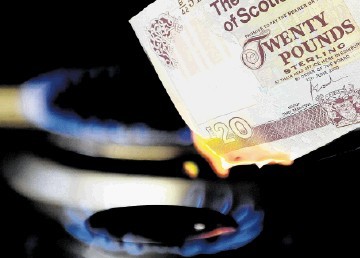
I was pleased to hear that the UK Government has agreed to investigate claims by a whistle blower that domestic gas prices are been rigged by traders in some of the companies involved.
Like most – if not all – energy consumers in Scotland I was not pleased to receive my latest gas and electricity bills, which I believe are much higher than they should be.
Oil and gas prices remain largely determined by world demand and supply. However, there has been some geographical fragmentation recently because of the shale oil and gas developments in the US.
There are two main price benchmark crudes – Brent and West Texas Intermediate (WTI). Traditionally WTI traded at a few dollars above Brent, because of transport costs, but that has been reversed in the recent past. For example, as I write this article Brent is $108 per barrel and WTI $85, which is a huge difference.
There have been much greater geographical variations in gas prices because of the limited pipeline infrastructure. However, the massive growth in LNG trade in recent years has reduced those differences.
In the US, domestic gas prices have plummeted because of shale gas. That has not yet happened in the UK and Europe. As discussed in last month’s Energy, shale gas has yet to become commercial.
Nevertheless, UK gas prices are about one third of the oil equivalent.
Domestic energy bills in Scotland are dominated by gas prices. Most people consume more gas than any other fuel in their homes and about 20% of our electricity is generated from gas-fired power stations.
I believe that domestic gas prices are much higher than they should be and that there are two main reasons for this.
Firstly, suppliers are displaying cartel behaviour which is enabling them to make artificially high profits. Secondly, the cost of subsidies for onshore windfarms.
The UK gas and electricity industry likes to portray itself as very competitive with six major companies and a larger number of smaller ones competing strongly against each other. In reality, it is a cartel or what we economists call an oligopoly.
Oligopolies can manipulate markets to their own benefit in much the same way as monopolies. Because of that the industry is regulated by the Office of the Gas and Electricity Markets (Ofgem). However, its performance has been little better than that of the much criticised Financial Services Authority (FSA).
I need not explain here how the FSA’s light touch regulation contributed to the collapse of Northern Rock and the ongoing problems at RBS and Lloyds Bank. And many people believe the FSA has learned nothing from that episode.
Ofgem has done nothing to prevent the collusion among the big six companies, which include Scottish and Southern Energy (SSE) and Scottish Power. That has inflated both company profits and my energy bills.
The latest allegations are that some traders have been manipulating the published wholesale gas prices in order to increase their companies’ profits . . . and presumably also their own bonuses.
All the big six have denied their involvement but it very reminiscent of the recent Libor scandal.
Libor is the London Interbank Offered Rate which is an important determinant of bank rates in the UK and therefore what you and I pay to borrow money and receive on savings.
Barclays Bank has already admitted being involved in rigging the rate and been fined £60million here and $360million in the US.
At least 20 other banks are currently being investigated and most of those are also expected to plead guilty.
The gas pricing allegations relate to prices at the National Balancing Point (NBP), a virtual trading hub which is the pricing and delivery point for the UK’s main natural gas futures contracts.
The whistle blower claims that traders have been rigging these prices in a similar way to the Libor scandal.
Whether or not the allegations are true, I have no doubt that gas and electricity prices in Scotland are much higher than they would be if there was real competition among the big six companies.
I blame Ofgem for that. Its lack of meaningful regulation is very similar with that of the FSA and the Bank of England during the financial crises that have beset Britain since 2008.
There are other issues to be resolved, notably the continued linking of many gas sales contracts to oil prices.
I have long argued that the two are increasingly different markets and that the link should be broken. The impact of shale gas on US prices is an excellent example of what real competition can achieve.
Tony Mackay is the MD of energy economists Mackay Consultants
Recommended for you
